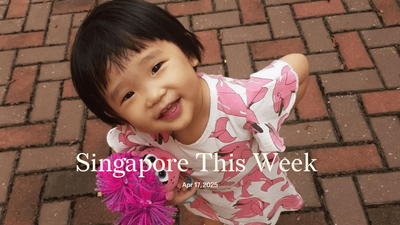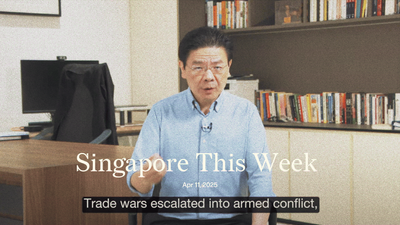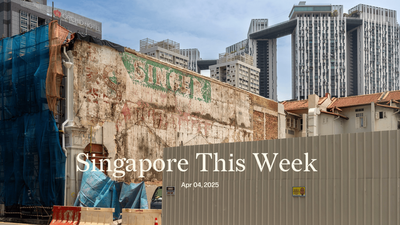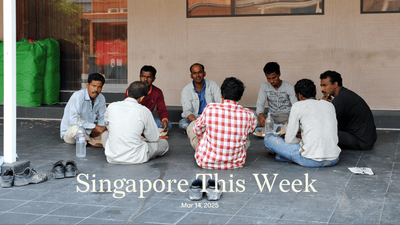Politics: In Lee We Trust
Singapore is tightening the leash around religious groups. Updates to the Maintenance of Religious Harmony Act (MRHA) mean, among other things, that “foreign influence” will be curtailed: groups must restrict leadership posts to citizens and residents, and declare foreign affiliations. Prevalent restraining orders that the government can issue to those who threaten religious harmony will be expanded to cover online communications. (Don’t doubt Jesus on Twitter.) Perhaps this is typical PAP paranoia, though just as plausible is that it’s an instrument of control. K Shanmugam, the home affairs and law minister, said that the law can be wielded if religious groups or LGBT groups “attack” each other. One wonders if it is meant to protect conservatives from liberal ideas around non-traditional families. In recently banning “#LookAtMe”, a new Singaporean film that pits a pastor against a queer ally, the authorities said it may be contrary to MRHA. It is worth remembering the genesis of the MRHA in 1990. In 1987, the PAP arrested and detained 22 activists, church workers, and opposition volunteers, the longest for three years. It claimed they were “Marxist conspirators” plotting to overthrow the state. The government never charged the 22 with a crime and has yet to offer conclusive proof of the plot. Jothie Rajah, a lawyer and legal scholar (and coincidentally Shanmugam’s ex-wife), has said that “The ‘Marxist Conspiracy’ was almost certainly the event that precipitated the Religious Harmony Act.” If true, the MRHA was born of political convenience—from which its relevance may persist. This week’s Jom essay is a profile of Chew Kheng Chuan (“KC Chew”), one of the 22.
Society: Flower power
From soft power to softer skin? Singapore’s national flower, the Vanda Miss Joaquim, is in the news again for an anti-ageing compound that was discovered by scientists mapping its DNA for the first time. They also extracted molecules with antioxidant properties that are often found in fruits and vegetables. The reason for decoding flora genome is to unearth natural compounds that are useful for understanding, preventing, and fighting diseases, says the orchid project’s co-lead. Besides an orchid’s apparent pro-health qualities, rare hybrid varieties play an important role in boosting bilateral relations here too—often named after visiting world leaders, royalty and celebrities. The practice, referred to as “orchid diplomacy”, took root in 1957 when Singapore was still under British colonial rule. There are currently more than 200 specially bred orchids residing in the VIP section of the Singapore Botanic Gardens’ National Orchid Garden. This includes political figures with questionable pasts, as well as autocratic and populist leanings. Brunei’s Sultan Hassanal Bolkiah and the Philippines’s Marcos Jr. were recent recipients. Still, it’s reassuring to know that diplomatic goodwill and friendship might have its limits. Intense speculation about orchid diplomacy persisted ahead of the Trump-Kim summit in 2018 (the father and grandfather of North Korean leader Kim Jong Un had flowers named for them). In the end, neither Trump nor Kim received an eponymous orchid. Even orchids have their limits.
Business: Priced out of homes
Property rental prices have grown at the fastest quarterly pace since 2007. For private homes, it rose by almost nine percent in the latest quarter, and for HDB (Housing Development Board) flats nearly 21 percent in the first nine months of this year. Nudging along this increase are higher home prices. Demand for rental homes, buoyed by an influx of foreign talent, returning Singaporeans, and international students, continues to outstrip supply, crimped by delays in the construction of new homes. To cash in on this trend, many landlords have increased their rents above market value. Some are asking for up to double existing rates. The surge in prices have left many tenants high and dry, scrambling to find cheaper options, which often means downsizing or moving to less central locations. Some desperate to secure a lease have been willing to outbid other potential tenants or sweeten their offers to landlords, like installing new air-conditioning units at their own expense. All this isn’t helped by new cooling measures to curtail the HDB resale market, where prices have skyrocketed despite rising interest rates. Instead, the chilling effect has had the opposite impact on rental prices: more private property downgraders are renting while serving the new 15-month, wait-out period before buying an HDB resale flat. Some pundits have warned that rising rental prices are unlikely to slow down anytime soon, providing little relief for tenants. Perhaps it’s time to move back to the family home?
Arts: SGIFF, Singapore’s largest film festival
Tickets to the Singapore International Film Festival (SGIFF) are selling fast. The 33rd edition features over 100 films from all over the world. “Assault”, a thriller by Kazakh director Adilkhan Yerzhanov, will be the festival’s first ever Central Asian opener. Singapore Panorama, SGIFF’s usual showcase of local features and shorts, includes “Boom”, a film adaptation of the 2007 play by Jean Tay, and a double bill of short films made with Virtual Reality technology. Unfortunately, at least two of the scheduled films will be dropped due to censorship decisions. Ken Kwek’s “#LookAtMe” recently made the news for being banned in Singapore and João Pedro Rodrigues’s queer musical fantasy, “Will-O’-The-Wisp”, was originally classified as “R21 To Be Passed with Edits” by the Infocomm Media Development Authority. SGIFF has withdrawn the latter in line with its longstanding policy of not showing films that have been cut. The festival runs from November 24th to December 4th.
Arts: Kalaa Utsavam, the Indian Festival of Arts
Christmas trees might already be sprouting in shopping malls but it’s still Deepavali at the Esplanade. After celebrating its 20th anniversary last year, Kalaa Utsavam is back with its multi-genre programme of international and Singaporean Indian arts. World-renowned sitarist Anoushka Shankar brings her singular sound to the Concert Hall in a collaboration with Austrian musician Manu Delago and Singapore’s own Orchestra of the Music Makers, while fans of hip hop can look forward to Malaysian group PU4LYF’s Second Home Tour. Another highlight is “Marabu”, a tribute to the late Cultural Medallion recipient and doyenne of classical Indian dance Santha Bhaskar. The performance is directed and choreographed by Meenakshy Bhaskar, Santha’s daughter, and features music composed by Indian flautist BV Balasai and a script from Singaporean playwright Alfian Sa’at. The festival runs from November 18th to 27th.
Internet culture: Twitter
Unlike in many other countries, in Singapore, Twitter is rarely used by politicians (and their trolls). They gravitate towards Facebook, Instagram and now–horrors—TikTok. This means that there is even more of an organic, unmediated sense to the conversations on the platform. It’s worth contemplating how any platform changes might affect that dynamic. After buying Twitter, Elon Musk fired four of the company’s top executives, including Vijaya Gadde, its head of legal policy, trust, and safety. Gadde was largely responsible for formulating policies that protected user anonymity in court; and removing accounts that spread misinformation, including Donald Trump’s. Twitter is also considering changing the verification process. What used to be a way for public figures and journalists to evade online impersonation is allegedly going to become a pay-to-play system. Users who pay for the verification subscription tier will receive priority within the algorithm alongside their profile badge. Apart from valid concerns that Musk’s tenure will usher in a new wave of online abuse (he has famously claimed that he will bring “free speech” back to the platform by being less censorial), it also seems that the Tesla Motors CEO is about to shrink Twitter’s user base simply by making the app very boring. Prioritising paying users’ Tweets will likely mean that deep-pocketed businesses and politicians will take over the timeline. The spontaneity and egalitarian nature of the platform will be no more. We might as well all move to LinkedIn.
History weekly by Faris Joraimi
The Ministry of Home Affairs and LawSoc president Adrian Tan both denounced billionaire Richard Branson’s refusal to participate in a televised debate on the death penalty, evoking Britain’s 19th-century opium wars against Qing China. They rightfully pointed out that the British Empire had forced China into opium addiction, so it could open up the latter as a market for its goods. But let’s not forget that the South-east Asian hub of this global drug trade was Singapore, whose free-port status for almost 100 years was financed mostly with opium revenue (at least 40-60 percent, according to historian Carl Trocki). Famous towkays, including Cheah Hong Lim, Tan Hiok Nee and Tan Seng Poh, profited handsomely from being opium farmers, which meant they bought rights to sell opium legally. This was mostly consumed by Chinese coolies for whom smoking chandu provided necessary relief from their miserable conditions. The East-versus-West clapback is an old favourite in the PAP (People’s Action Party) playbook, but it’s bad history: many Asians actively took advantage of the colonial system at the expense of their fellow Asians. If one examines wealth inequality in Singapore today, and contrasts the lifestyles of the richest and poorest, it might seem like little has changed. That low-income Asians are lured into smuggling drugs and then killed by the state is an indictment of the whole system—regardless of who points it out.
Tech: TikTok’s next game-changer?
TikTok danced into Facebook’s turf, can it do the same for gaming? In May, we learned that short-form video content platform TikTok had begun testing games in Vietnam and expanded its partnership with Zynga to offer HTML-5-based games—indicating a big push for gaming. This may come as a surprise given that Bytedance, Tiktok’s parent company in China, was last September reportedly aggressively downsizing its video game business, though that’s likely due to the Chinese Government’s crackdown on the local gaming industry. While competitors such as Snapchat and Facebook have abandoned gaming, TikTok just announced that it would launch a standalone tab dedicated for in-app games on its platform, following the footsteps of Netflix. This special feature will be unveiled on November 2nd, at a special event called “TikTok Made Me Play It”. Impressively, gaming giants such as Electronic Arts, VNG Games, NetEase Games, and HoYoverse will be among the speakers. TikTok has already disrupted social media. Is it about to do the same to the multi-billion-dollar gaming industry?
Tech: Entrepreneur First halt programmes in Singapore
UK-based start-up incubator, Entrepreneur First (EF), announced that it will suspend operations in Singapore after its ongoing 12th cohort graduates in 2023, to focus on Europe, North America, and India. This move is part of the company’s strategic shift to focus on fewer hubs where the size of the local talent pools positions them to scale to running multiple vertical programmes concurrently. The move comes as a surprise given that EF secured a US$158 million (S$220m) Series C funding round from a group of veteran technology founders in June, this year. While it bids its Singapore hub “goodbye”, EF said that it will continue to support its Singapore portfolio with its global team and funding network. At least, EF didn’t leave them hanging.
Tech: A new kid in the AgriTech Block
Unbeknownst to many, rice contributes 25-33 percent of South-east Asia's total methane emissions. Coupled with an increasingly vulnerable farmer population due to climate change, this calls for new, sustainable practices and appropriate economic incentives to drive their adoption. Fortunately, leading funds such as Wavemaker Impact, Bill Gates’s Breakthrough Energy Ventures, Temasek and its subsidiary fund GenZero have stepped up to set up a new agritech stealth start-up aimed at decarbonising rice production in Asia and improving the livelihood of farmers. The technologies to cut emissions and raise yields are not new. But their adoption has been slowed by the diversity of farming practices, challenging infrastructure, and a lack of inputs and incentives. The start-up’s platform aims to facilitate this. The leading investors poured in an undisclosed amount of seed funding into the new company, which will be used for R&D and hiring staff. While the seeds have been sown for greener rice, it will still remain a substantial contributor to emissions in the region.
If you enjoy Jom’s work, do get a paid subscription today to support independent journalism in Singapore.







